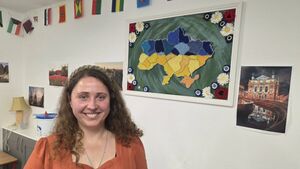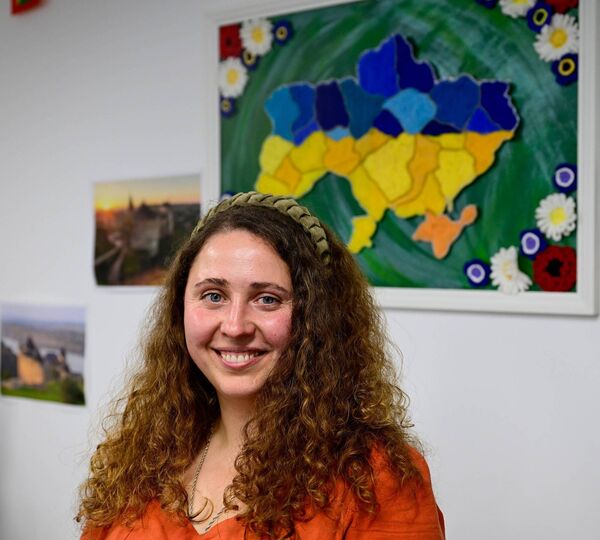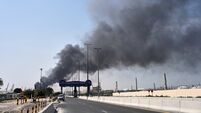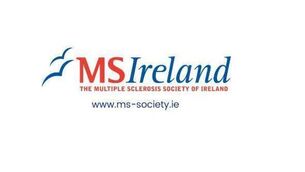Living with the trauma of war many miles from home

Tetiana Vysotska who fled Ukraine with her family after the outbreak of war in February 2022.
Tetiana Vysotska talks about her own memories of experiencing war in Ukraine as though it was yesterday. The terror and anguish of a living nightmare are still as fresh as ever.
Her own city of Bucha, located about 25 kilometres from the capital of Kiev, was among the first cities which came under attack when Russia first invaded in February 2022.
The brutal reality of a large scale invasion was never more stark for Tetiana, her husband and their two children when a missile crashed and embedded itself into the ceiling of their first floor apartment.
Incredibly it didn’t detonate despite the deafening noise of explosions nearby.
For sixteen days, they were forced to lock themselves in their apartment, and like many other residents, had to living frugally when the Russian troops cut off the water and heating supplies, and took over nearby shops.
“We lived on the first floor and we had to block all the windows with things like mattresses and cardboard boxes because when the guns were shooting, the bullets could hit your windows.
“We stayed on the floor during this time, always crawling on the floor and staying lower than the level of the window. You couldn’t have bright lights on because there was a risk that the soldiers would come to your apartment, so we hid under the table, put the candle there where the kids could draw and paint.”
Her oldest daughter Natalia turned nine the day after the war broke out and her only birthday present not damaged or destroyed was a Lego set which became a constant for her during the family’s arduous but reluctant journey to leave their home country.
The declaration of a first humanitarian corridor during the war prompted the beginning of that journey and through a circuitous route helped by a network of friends, they managed to get to Hungary and fly to Ireland via Budapest.
On March 27th 2022, they arrived at Dublin Airport and then spent a number of weeks with friends near Oranmore, Co Galway before finding a home in Creggs on the Galway/Roscommon border where they still reside.
Tetiana worked as a languages teacher in Ukraine and was keen to apply her good command of the English language to help other families who had also fled the conflict.
She initially became a volunteer worker at Castlerea Community & Family Resource Centre in West Roscommon before taking on a full-time role there as an inclusion officer two years ago.
Being away from the horror of war unfortunately did not mean she and her family did not continue to be affected.
Indeed, Tetiana recounts a time when she and her family were taking part in a local festival in Roscommon when her youngest daughter Maria (8) became frightened when she saw a spider drone overhead.
“When my younger daughter saw it, she was hiding under my arm and saying ‘Mommy hide me. I'm afraid of the drone’. So here we are in Ireland, we are in a peaceful country. She sees it in the sky and she gets scared”.
The conditioning of war also impacted on Tetiana herself when she was studying a part-time course in art therapy. “There was this big metal thing on the wall in class and it fell a few times and I got this physical urge to get under the table and hide. My body reacted before I started thinking. On two occasions, I had to leave the class to get some water.”
It was in the area of art therapy where she found some solace and also used those skills in classes she helped organise for Ukrainian children living locally.
“The main thing was to create the space for kids to live through their trauma, to talk about their disappointment, their anger, their stress, their fears, their hope.”

Tetiana has very strong perspectives on the effects of trauma on people and their mental health, not just because of her own and her family’s personal experiences but because of her pending PHD research, funded by the Irish Research Council.
Part of that research will look at the impact of trauma on the development of language in young children.
Tetiana knows several Ukrainian children who had been reaching the standard speech milestones but following the war, these children, some now aged 5, have completely stopped talking.
“They don’t talk because of the trauma from the war. It's not like the two year old child needs to witness someone being shot in front of them to stop talking. It’s everything that’s going on around them. With all the sounds, with all the fear. Kids read the parents better than the any kind of detectors.
“Trauma just doesn’t affect language but language does suffer because that's our personal connection with the world. And if the world is not safe, do I want to connect with the world with speech?".
The second part of her research will look at developing protocols in Ireland to assess Ukrainian/Russian/English speaking children in the area of language disorders and development.
She hopes that her PHD research will helps shine a light on how trauma can affect speech and language and lead to better protocols for supports in this area.
“Even if my work will be a little drop in the ocean of the requests to support that field, it will be more than enough for me. Drop by drop but it's important,” said.
A recent research paper led by staff from the University of Limerick’s School of Medicine and the HSE has revealed the clear mental and physical toll the war has taken on many Ukrainian people living here.
491 Ukrainian beneficiaries of temporary protection registered with Ballyvaughan Medical Centre in Clare were involved in the analysis. The study period covered 24 months from March 22nd 2022 to February 22nd 2024.
Heart conditions, blood pressure, gastrointestinal issues and thyroid disorders were among the common presentations at the medical centre. The research noted that Ukraine is a region endemic for thyroid disorders, "particularly due to the long-term consequences of the Chernobyl nuclear disaster".
The research also found that a major concern within this population is "major depressive disorder".
“War-related tragedies, such as loss, family separation, displacement, and lack of support, significantly impact mental health. Ukrainians may experience distress due to war-related trauma, living in the Russian-occupied territories, forced displacement from their homeland, and difficulties in navigating social, and cultural nuances in Ireland, and language barriers,” said the study.
Tetiana strongly agrees with those findings particularly noting that, in her own experience of working with her community, language barriers are very significant impediments to accessing the right supports and medical advice in Ireland.
“There are some people who can ask a friend who speaks English to translate for them, or they may be more fluent with their gadgets and they can use Google Translate.
“But for others, not having the opportunity to communicate and reach out without the language can be very stressful.”
Tetiana points out that she is aware of a number of psychologists and counsellors from the Ukrainian community in Ireland who are eager to help on a voluntarily basis.
“But it's not allowed by law because the documents are not legalised here. I think it's something that should be looked at. I'm not questioning the laws and I'm not questioning the system and I don’t want to do that. But I think they could look at it from the position of how to make that percentage of people with depression lower.”
She suggested that these Ukrainian professionals could do some extra courses or exams to allow them to help their own communities.
“They have the language, they have the cultural context, they have the desire, ability and experience. Do that and it will be a win, win situation.”
The research paper also noted that frequent exposure to news is associated with increased anxiety and depression among Ukrainian refugees.
Tetiana agrees that for her and other people in her community, checking their phones to find out about the welfare of other family members in Ukraine can often be a nervous experience. She does however try to manage her consumption of news.
According to the CSO, 80,341 out of a total of 113,917 Ukrainian beneficiaries of temporary protection (BOTP) who came to Ireland since February 2022 are now living in the State.
Tetiana speaks sadly about those Ukrainian refugees in Ireland who are still living in hotels, thinking originally that the war would be long over by now.
“They live in these hotels with the expectation that ‘Tomorrow I'm going home. I am not building my life here. I'm here just to wait for the war to be over'.
“But they are still here. Time has moved on, but they haven't moved on.”
For many of them, either has the trauma of war.





